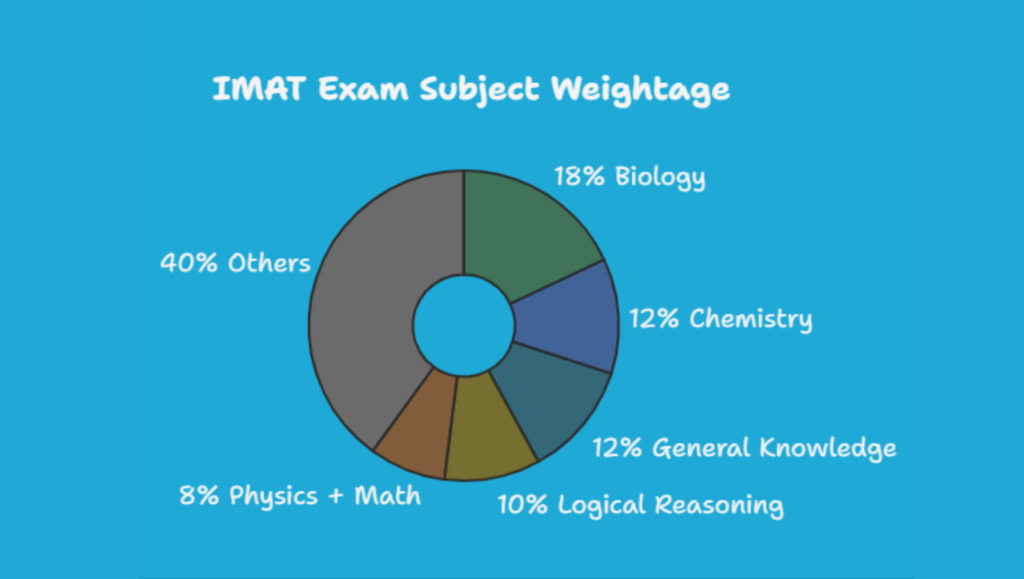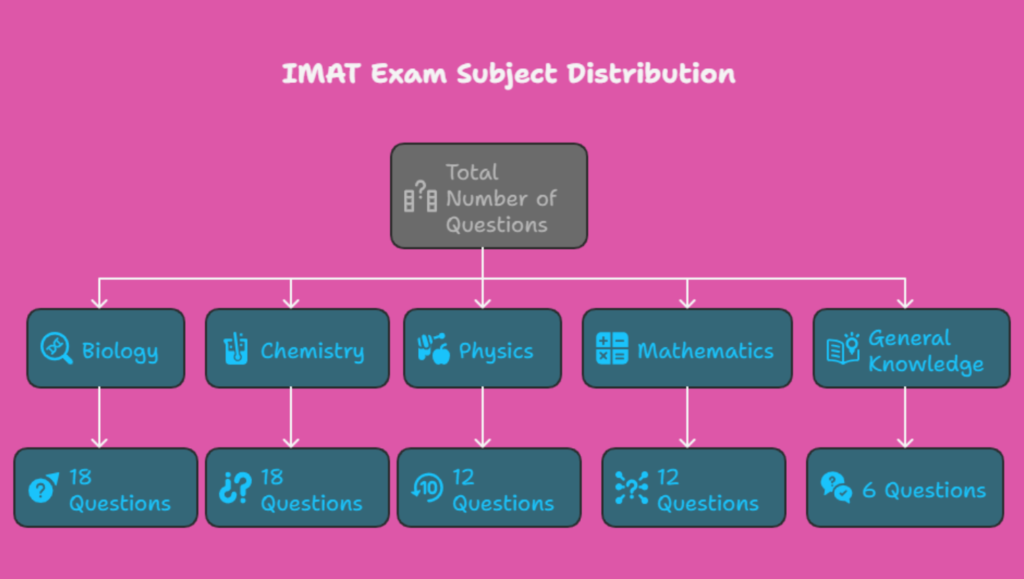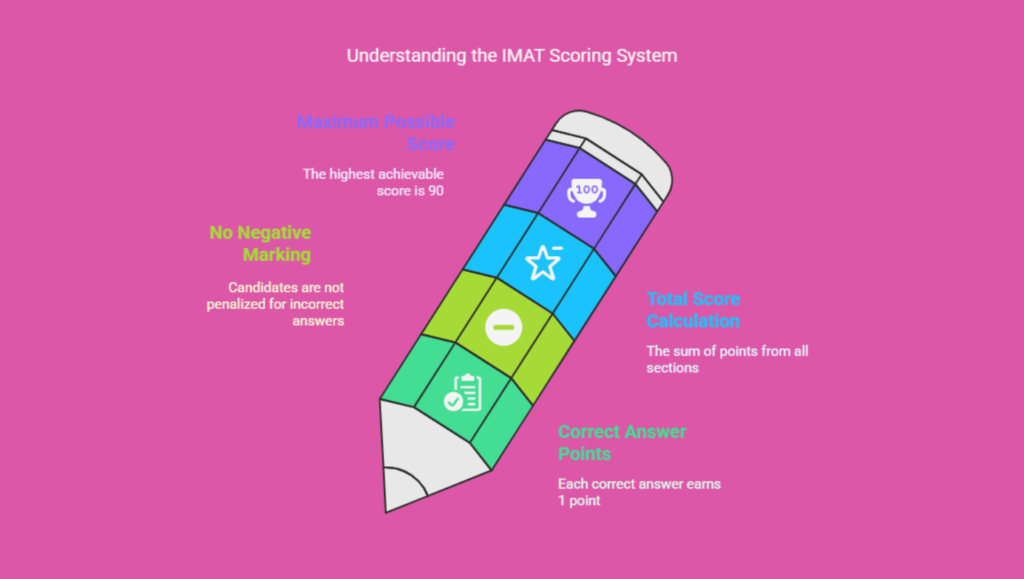Table of Contents

The IMAT is a special test for students who want to study medicine in Italy. It stands for International Medical Admission Test. Universities use it to decide who gets to study in their English-taught medical programs.
Many students from around the world take this test. If you want to become a doctor in Italy, this is the test you need to pass.
Why is it so important to learn about the subjects covered in IMAT and their weightage?
Well, the IMAT has different subjects like Biology, Chemistry, Logic, and more. But not all subjects are equal. Some have more questions than others. That means they carry more marks. Knowing this helps you prepare better and spend more time on the most important subjects.
So, before you start studying, it’s smart to understand the subjects covered in IMAT and their weightage. This way, you can make a good plan and score higher!
Subjects Covered in IMAT and Their Weightage

The IMAT test is made up of different subjects. Every subject includes a specific number of questions. Some subjects are more important than others because they have more questions and marks. Let’s look at all the subjects covered in IMAT and their weightage.
2.1 Logical Reasoning and Problem Solving
Logical Reasoning and Problem Solving is an important section of the IMAT exam. Even though it has fewer questions than some other subjects, it helps show how well you can think clearly and solve problems.
What this section is about
This section tests how your brain works when it sees something new or tricky. You don’t need to remember facts. Instead, you look at clues, find patterns, and think step by step to get the right answer.
Think of it like brain games or puzzles. The questions might look tough at first, but if you practice, you’ll improve and work faster!

Types of Questions
Here are some types of questions you may see in this part:
- Look for the pattern: Pick the next shape or number in the sequence.
- Word puzzles: Fill in blanks or guess the right word from clues.
- True or false thinking: Read a short paragraph and pick what’s true.
- Math-based logic: Use numbers and clues to find the answer.
- Decision making: Choose the best or fastest way to solve a small problem.
These questions don’t need formulas or big facts. They need your thinking skills!
Number of Questions and Weight
In the list of subjects covered in IMAT and their weightage, Logical Reasoning and Problem Solving have:
- 10 questions
- Each question = 1 mark
- Total weight = 10 marks
This section makes up 1/6 of the whole IMAT exam. That means it’s a good way to earn easy marks if you practice well.
2.2 General Knowledge
General Knowledge is one of the subjects covered in IMAT, and its weightage is pretty big! This part checks how much you know about the world, not just what you study in school.

What Topics Are Included?
The truth is, there’s no fixed list. The questions can be about many different things. They can come from:
- History
- Geography
- Science
- Politics
- Famous people
- World events
- Art and culture
It’s like all the fun and interesting facts you learn from reading books, watching the news, or exploring the internet.
Examples of General Knowledge Questions
Here are some examples of what a general knowledge question might look like in IMAT:
- The first person to walk on the moon was Neil Armstrong.
- What is the capital city of Japan?
- Which planet is known as the Red Planet?
- Who wrote “Romeo and Juliet”?
- What is the United Nations?
You don’t need to know everything, but having a curious mind and reading often can help!
Number of Questions and Weight
In the list of subjects covered in IMAT and their weightage, General Knowledge has:
- 12 questions
- Each question = 1 mark
- Total weight = 12 marks
That’s a big part of the IMAT exam. It has more questions than logic, and even the same number as chemistry!
2.3 Biology
Biology is the most important of all the subjects covered in IMAT, and its weightage is the highest. If you want to become a doctor, you really need to know biology well. This section is all about living things and how the human body works.
What Topics in Biology Are Covered?
Here are the main biology topics you should study for IMAT:
- Cells: Parts of a cell, what they do, and how they grow.
- Genetics: DNA, genes, and how traits are passed from parents to kids.
- Tissues and Organs: What makes up the body, and how it works.
- Human Body Systems: Heart, lungs, brain, muscles, and more.
- Reproduction: How living things make babies.
- Biological Molecules: Proteins, fats, sugars, and enzymes.
- Immune System: How your body fights sickness.
- Evolution and Classification: How animals change over time and how we group them.
These topics are not just important for the exam, they are also the basis of everything you will study in medical school!
Importance of Biology in IMAT
Biology has the highest number of questions in the IMAT. That means it gives you the best chance to earn marks. If you do well in biology, your overall score can jump up a lot.
Many students love biology because it’s easy to understand and fun to learn. It’s also helpful in real life when you want to know how your body works or how to stay healthy.
So, if you’re aiming to score high, biology should be your top priority among all the subjects covered in IMAT and their weightage.
Number of Questions and Weight
Here’s how biology fits into the IMAT exam:
- 18 questions
- Each question = 1 mark
- Total weight = 18 marks
That’s almost one-third of the whole IMAT test! No other subject has this much weight. That’s why mastering biology is a must.
2.4 Chemistry
Chemistry is another big part of the subjects covered in IMAT, and its weightage is just behind biology. It’s all about learning what things are made of and how they change. In medicine, chemistry helps you understand how the body works at the smallest level, like inside your cells!
Key Topics from Chemistry
Here are the main chemistry topics you should know for IMAT:
- Atoms and Elements: What everything is made of.
- Periodic Table: Understanding metals, nonmetals, and how elements are grouped.
- Chemical Reactions: How substances mix or change.
- Acids and Bases: What they are and how they work in the body.
- Chemical Bonds: How atoms stick together.
- Solutions and Concentrations: How things dissolve, like sugar in tea.
- Organic Chemistry: Learning about carbon, which is found in all living things.
- Gas Laws and States of Matter: Solids, liquids, gases, and how they change.
These topics are fun and full of cool facts that explain everyday things like cooking, cleaning, and even breathing!
How It Helps in Medical Studies
You might wonder: “Why do doctors need to know chemistry?”
That’s a great question!
- Chemistry helps doctors understand how medicines work.
- It explains how the body uses oxygen and nutrients.
- It helps with lab tests and diagnosis.
- Chemistry helps us understand how the body keeps its pH and fluids balanced.
So, if you understand chemistry, it’ll be much easier to study medicine later on.
Number of Questions and Weight
Among all the subjects covered in IMAT and their weightage, Chemistry has:
- 12 questions
- Each question = 1 mark
- Total weight = 12 marks
This means Chemistry is tied with General Knowledge and gives you a good chunk of the overall marks.
Many students find chemistry hard at first, but once they understand the basics, it becomes super interesting! Don’t skip it, it’s very important for scoring well in the IMAT and becoming a great doctor.
2.5 Physics and Mathematics
Physics and Mathematics are the final parts of the subjects covered in IMAT, and their weightage is the lowest. But don’t let that fool you! Even a few marks from this section can help you beat the competition.
What Topics Are Tested
This section checks your basic math and physics skills, things you’ve likely learned in school. Here are the key topics:
Physics Topics:
- Motion (speed, distance, time)
- Forces and Newton’s Laws
- Work, Energy, and Power
- Light and Sound
- Electricity and Circuits
- Heat and Temperature
- Pressure and Density
Math Topics:
- Algebra (solving for x)
- Fractions and Decimals
- Percentages and Ratios
- Graphs and Charts
- Geometry (angles, shapes)
- Probability and Statistics
- Simple Equations and Functions
You don’t have to be a math expert, just good at the basics!
Tips for Solving Physics/Math Quickly
Here are some easy tips to help you save time and get the right answers:
- Practice often: Do a few math or physics questions every day.
- Use formulas: Learn important formulas so you don’t spend time trying to remember them during the exam.
- Keep calm: If a question seems tough, skip it and return to it later.
- Estimate: If you’re stuck, eliminate wrong answers and make a smart guess.
- Draw diagrams: In physics, sketching a quick picture helps a lot!
Since this section is small, speed and accuracy are the keys to scoring well.
Number of Questions and Weight
Here’s how Physics and Mathematics fit in the list of subjects covered in IMAT and their weightage:
- 8 questions
- Each question = 1 mark
- Total weight = 8 marks
This is the smallest section of the IMAT. But scoring even 6 out of 8 can boost your rank, especially if others skip it.
So don’t ignore this section! A little effort can make a big difference in your final score.
3. Total Number of Questions and Marks
Now that you know the subjects covered in IMAT and their weightage, let’s see how many questions there are in total and how the scoring works.
How Many Questions in Each Subject?
The IMAT exam includes 60 questions in total. Here’s the full breakdown by subject:

Total Marks
Each question is worth 1 mark. So, the total marks you can get on the IMAT exam are:
60 questions × 1 mark each = 60 marks total
How Scoring Works
- You earn 1 point for each correct answer.
- There is no negative marking, so you don’t lose marks if you answer wrong.
- It’s best to answer all questions because every correct answer adds to your score.
- The higher your total marks out of 60, the better your chances of getting into medical school in Italy.
Because of the different number of questions in each subject, some subjects have more power to increase your score. For example, biology has 18 questions, so doing well there can help your score a lot!

Now you have a clear idea of the subjects covered in IMAT and their weightage, how many questions there are, and how the marks add up. This will help you organize your study time and concentrate on the most important subjects.
4. Why Knowing the Subject Weightage Helps You Prepare Better
When you prepare for the IMAT exam, it’s really important to know the subjects covered in IMAT and their weightage. This helps you study smarter, not just harder.
Focus More on High-Weightage Subjects
Some subjects have more questions and marks than others. For example, biology has 18 questions while physics and math have only 8. This means:
- Spending more time on biology will give you a better chance of getting more marks.
- Chemistry and general knowledge also have many questions, so they need good attention too.
Focusing on the big subjects helps you score higher because they count more in the final result.
Plan Your Study Time Smartly
If you try to study everything equally, you might waste time on topics that don’t help much. Instead:
- Create a study plan that focuses more on subjects with more questions.
- Give more time to biology, chemistry, and general knowledge first.
- Use shorter study sessions for physics, math, and logic since they have fewer questions.
This way, you use your study time in the best way and avoid feeling tired or confused.
Avoid Wasting Time on Less Important Topics
Knowing the weightage also stops you from spending too much time on easy or less important parts. For example:
- Don’t spend too many hours only on physics and math, since they have fewer questions.
- Avoid getting stuck on tiny details that don’t appear much in the exam.
Focus on what really matters and make every study minute count.
By knowing the subjects covered in IMAT and their weightage, you can create a smart study plan that helps you pass the exam with a good score. Remember, studying smart is always better than studying too much without a plan!
5. Sample Study Plan Based on Weightage

Knowing the subjects covered in IMAT and their weightage helps you make a good study plan. Here’s a simple 1-week plan to get started, with ideas on what to focus on and how to revise.
1-Week Plan Sample
| Day | Subject(s) | Focus Area |
| Day 1 | Biology | Cells and Human Body Systems |
| Day 2 | Chemistry | Atoms, Elements, and Reactions |
| Day 3 | General Knowledge | History and Geography |
| Day 4 | Biology | Genetics and Reproduction |
| Day 5 | Logical Reasoning and Problem Solving | Practice puzzles and patterns |
| Day 6 | Chemistry and Physics/Math | Acids, Bases + Motion and Algebra |
| Day 7 | Revision | Review all subjects briefly |
High-Priority vs. Low-Priority Subjects
- High-priority subjects: Biology, Chemistry, General Knowledge
These have the most questions and the biggest weight in the exam. Spend more time on them. - Low-priority subjects: Logical Reasoning, Physics, and Mathematics
They have fewer questions, but still important. Practice regularly, but don’t spend too much time.
How to Revise Effectively
- Review notes every day: Go over your notes every day so you don’t have to rush at the end!
- Use flashcards: Great for quick facts in General Knowledge and Chemistry.
- Practice past papers: Solve past papers to get familiar with the types of questions and how much time you have.
- Teach someone else: Explaining topics out loud helps you remember better.
- Take breaks: Studying for hours without rest can make you tired and slow.
By following a plan based on the subjects covered in IMAT and their weightage, you can study smart and stay confident for your exam day!
6. Mistakes Students Make With Subject Weightage

When preparing for IMAT, many students make mistakes by not using the subjects covered in IMAT and their weightage correctly. These mistakes can lower their scores even if they study a lot.
Ignoring General Knowledge
Some students think general knowledge is not important or too random. But it has 12 questions and can give you easy marks if you prepare a little every day. Ignoring this part means missing out on a good chunk of marks.
Spending Too Much Time on Physics
Physics and math together only have 8 questions. Spending too many hours on them means less time for biology and chemistry, which have more questions. This is a common mistake that lowers overall scores.
Not Practicing Logical Reasoning Enough
Logical reasoning has only 10 questions, but these are not easy. They test how well you think, solve problems, and understand patterns. Many students skip practicing these skills and lose easy points.
Balance Is Key
The best way to avoid these mistakes is to balance your study time according to the subjects covered in IMAT and their weightage. Focus more on high-weight subjects, but don’t forget to practice the smaller ones too.
By avoiding these common mistakes, you can improve your IMAT score and get closer to your goal of studying medicine in Italy!
7. Tips to Score Higher in Each IMAT Subject

To do well in IMAT, it helps to know the subjects covered in IMAT and their weightage and prepare for each one carefully. Here are some tips and resources to help you score higher in every subject.
Logical Reasoning and Problem Solving
- Prep Tip: Practice puzzles, patterns, and problem-solving questions every day. Try to improve speed and accuracy.
- Best Resources: IMAT practice tests, brain games apps like Lumosity, and reasoning books for beginners.
- Practice Regularly: Set aside 15–20 minutes daily to solve reasoning problems.
General Knowledge
- Prep Tip: Read about current events, history, geography, and science basics. Watch news summaries and use quiz apps.
- Best Resources: BBC News, National Geographic Kids, and general knowledge quiz apps.
- Practice Regularly: Try daily quizzes or flashcards to remember facts.
Biology
- Prep Tip: Focus on key topics like cells, human body systems, genetics, and reproduction. Use diagrams and videos to better understand.
- Best Resources: School biology textbooks, Khan Academy biology videos, and IMAT biology past papers.
- Practice Regularly: Make summary notes and test yourself weekly.
Chemistry
- Prep Tip: Understand basic concepts like atoms, elements, chemical reactions, and acids and bases. Use visual aids and simple experiments if possible.
- Best Resources: Chemistry textbooks, CrashCourse Chemistry videos, and IMAT practice questions.
- Practice Regularly: Do exercises and review formulas often.
Physics and Mathematics
- Prep Tip: Review basic physics concepts and math skills like algebra and geometry. Practice solving problems with formulas.
- Best Resources: School physics and math books, Khan Academy, and IMAT sample papers.
- Practice Regularly: Practice every day to get faster and make fewer mistakes.
Practice Regularly for All Subjects
The best way to improve in all the subjects covered in IMAT and their weightage is to practice regularly. Try to solve past exam papers and timed quizzes to get comfortable with the test format and timing.
Following these tips will help you study smart and score higher in your IMAT exam!
Conclusion:
To get ready for the IMAT exam, it’s really important to understand the subjects covered in IMAT and their weightage. This knowledge helps you study in the smartest way possible.
Summary of the Subjects
The IMAT exam includes five main subjects:
- Logical Reasoning and Problem Solving
- General Knowledge
- Biology
- Chemistry
- Physics and Mathematics
Each subject tests different skills and knowledge that you need to succeed in medical studies.
Summary of Weightage
The number of questions and marks each subject has are different:
- Biology has the most with 18 questions
- General Knowledge and Chemistry each have 12 questions
- Logical Reasoning has 10 questions
- Physics and Mathematics have the fewest with 8 questions
Knowing this helps you spend more time on subjects that matter most.
Final Words on Planning Smart
Preparing for IMAT is not just about studying hard — it’s about studying smart. Use the subjects covered in IMAT and their weightage to create a study plan that focuses on the most important parts first. Practice regularly, revise often, and keep calm on exam day.
With the right plan and effort, you can do well and take a big step toward your dream of studying medicine in Italy!
FAQs About Subjects Covered in IMAT and Their Weightage
Q1. What is the most important subject in IMAT?
The most important subject is Biology because it has the highest number of questions, 18 out of 60. Scoring well in biology can really boost your total marks.
Q2. How many questions are from biology in IMAT?
There are 18 questions from biology in the IMAT exam. This makes it the subject with the biggest weightage.
Q3. Does general knowledge matter in IMAT?
Yes, general knowledge is important. It has 12 questions and covers topics like current events, history, and geography. It can be easier to score marks here with regular preparation.
Q4. Which subject has the lowest weightage in IMAT?
Physics and Mathematics together have the lowest weightage with only 8 questions. But it’s still important to practice because every mark counts.
Q5. Should I study all subjects equally for IMAT?
No, you should focus more on subjects with higher weightage, like biology, chemistry, and general knowledge. But don’t ignore logical reasoning, physics, and math completely — they can help improve your score too.


